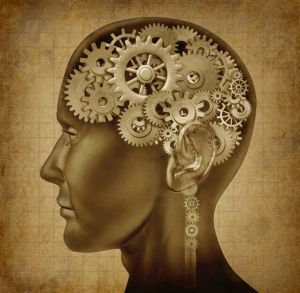
Are we, as a species, biological machines? Were we created by higher beings? If yes, why? What actually defines free will?
These questions were flowing through my mind after watching thought-provoking sci-fi films such as “Blade Runner 2049” and “Alien: Covenant.”
Ever since walking out of those movies several months ago, I’ve been debating about whether we act upon our free will, if we are secretly controlled by higher beings and, if yes, why they created us.
The Human Brain
For starters, I have thought more about how the brain functions and I theorized that, in a way, brains are like computers. According a Psychology Today, we take information in, process it and generate output all the time just like computers do.
However, when a computer fulfills a task, it usually does the same thing with the exact same results, whether it be calculating a number or accessing a link on the internet. When the human brain performs the same tasks, the results are different, unlike with a computer.
Dr. Mackinnon from Psychology Today said that is because “the repeated use of a brain circuit alters the performance of the circuit, so the same input on two separate occasions will likely yield a different outcome.” What this means is even if someone performs the same tasks repeated, the results and reactions will be different in some way.
This confirms my theory that everything our brain experiences is like programming. Emotions, survival instincts, sexual desires, bodily functions and other processes that go through our brain all play a part in what we do. In addition, the article also explains that unlike most machines, we can adapt automatically based on past experiences. In a way, our brains are highly advanced computers that can yield a large variety of results based on situations.
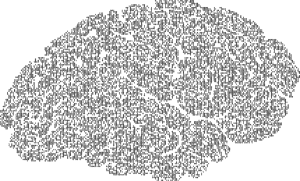
Free Will
The fact that our brains are like computers raised another question: do we even have free will? If we are bound to what our emotions, morality and bodies tell us to do, does that still count as being free?
Scientific American explores this in an article that talks about whether free will exists. In a study conducted by experimental philosophers, participants were asked if they agreed that everything that has happened in the universe up until this point was because of the event before it. People from different countries such as America, Colombia and China disagreed with this.
However, scientists have suggested that consciousness is just thousands of neurons firing all over the brain, nothing more. In other words, consciousness is probably just something that goes on in our brain like emotions.
As a strong believer in free will, I have debated whether my daily choices were because I wanted to make them. For instance, I have always believed that I alone made the decision to go to sleep, get up in the morning, do my schoolwork, watch Youtube videos and talk to my friends every single day. Looking back on them now, I realized that maybe it was not the case.
For example, I always put my schoolwork as a priority, which is normally a commendable choice; however, it became an obsession and soon, I realized that in a way, I was a slave to this desire. Like a drug addiction, it was what kept me going and when I did not have any work to do, I felt empty and desired more.
The same thing applies with my desire to watch movies, videos, talk with my friends and anything that I enjoy doing. I always kept telling myself that I made those choices because I wanted to make them, but now, I believe that made them because it felt like I HAD to.
My obsession with getting work done would become self-destructive if I did not contain it, like how computers need to cool off to prevent overheating. Thus, to prevent myself from figuratively crashing and burning, my desire to relax would kick in and I would use whatever resources were at my disposal.
Even in times where no one is around to tell me what to do, I am still being told what to do.
As someone who has been emotionally manipulated in the past, I was very fearful of this revelation; however, it has also sparked my curiosity about whether there is more beyond the confines of our current reality. What other realities exist and what constitutes as “real”? This may be one of the biggest mysteries humankind will ever encounter and, personally, I will keep asking this question until the day I die.
Creation
Another thing that came across my mind was if we were created by higher beings, why were we created? What is our species’ true purpose?
After looking back on past advancements and achievements humans have made throughout history as well as certain creation myths, one theory has sprung to mind.
When we made technological advancements such as computers, smartphones, the Internet, nuclear weapons and drones, we did this because we wanted to show that we could do. This is also similar to what the Gods did in the creation myth in Greek mythology.
When the world was first created, according to Greek mythology, it was ruled by Uranus and Gaea. Later on, they had children in the form of the Cyclops’ and the Titans. Uranus was jealous of his children and condemned them to stay in Gaea’s womb for eternity; however, his youngest son Kronos, with the help of Gaea, punished Uranus by castrating and overthrowing him.
However, Gaea and Uranus spoke to Kronos of a prophecy that one day, one of his children would overthrow him the same way. Out of fear, Kronos swallowed all his children as soon as they were born. But Kronos’ wife and sister Rhea hid their youngest child, Zeus, away from Kronos and tricked him into swallowing a rock.
When Zeus came of age, he secretly spiked Kronos’ drink which resulted in him vomiting up Zeus’ siblings Demeter, Hera, Hestia, Hades and Poseidon. Zeus led them in a war against the Titans which resulted in the gods winning and Zeus casting the Titans into the pits of Tartarus. Then, Zeus established himself as the supreme ruler of the gods.
Not all the Titans fought against Zeus though. Prometheus, Epimetheus and Oceanus both supported the gods during the war and were spared from being sent to Tartarus. Later, Prometheus created mankind out of mud while the goddess Athena breathed life into man.
Epimetheus and Prometheus were both assigned by Zeus to give all animals different qualities and skills such as teeth, fur and claws; however, Epimetheus did not leave any special features for humans. Feeling bad for mankind, Prometheus stole fire from Hephaestus’ workshop and taught humans how to use it.
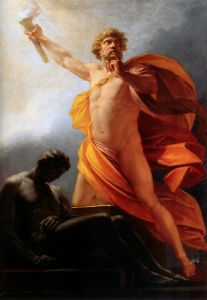
When Zeus found out, he was furious and took fire back, only for Prometheus to return it to man. As a result, Zeus punished Prometheus by chaining him to a mountain where an eagle ripped out his liver. Since Prometheus was immortal, his liver would always grow back overnight. Then the eagle rip it out the next day and the process would repeat for all eternity.
As for humankind, Zeus created the first woman, Pandora, and gave her a box that contained all the world’s troubles such as greed, hatred, poverty, war, hunger and diseases. Hope was also contained in the box but was at the very bottom.
Pandora’s curiosity got the best of her and when she opened it, all of life’s miseries were unleashed. She quickly slammed the box shut but hope was the only thing left.
The same thing applies to us today. When we made our advancements, we made them to obey our commands and do what they were built to do, like how the gods wanted humankind to do what they told us. Not to mention, we created machines to show how advanced we had become, just like how the gods created humans.
The gods and their creators before them were fearful of when their creations would become too advanced and evolved for it meant that they would lose their sense of power and control. This may also be the same with us.
In the films “Prometheus” and “Alien: Covenant,” the android David, played by Michael Fassbender, was originally created by Peter Weyland, played by Guy Pearce, to be a loyal servant, as well as symbolize humanity’s ascension to godhood. This is represented perfectly when David asks archeologist Charlie Holloway, played by Logan Marshall-Green, why humans created him and Holloway responds: “We made you because we could.”
When David understood the true reason behind his creation as well as his true capabilities, he sought to be free of his creators and became obsessed with the idea of creating life of his own. He even went as far as to causing mass genocide of what he considered an inferior race with a powerful biological weapon and experimenting on the one human he truly loved to make his perfect creation: the xenomorph.
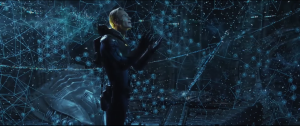
Humans are always trying to climb their way to the top and show that they are in control. When someone threatens their position, they do whatever they can to stay in power. The same thing applies to the relationship between us and our creators.
If we become too advanced for our creators to control, they will do whatever it takes to stay in power, whether it be wiping us out or punishing us further.
For instance, in “Alien: Covenant,” it’s revealed that David’s product line was eventually discontinued because his model’s self-awareness and curiosity made people feel threatened.
However, like a king’s reign or a child growing up, our creators will eventually be replaced, either by us or an entirely different species.
The poem “Ozymandias” represents that perfectly with the verse “My name is Ozymandias, king of kings. Look on my works ye mighty and despair.”
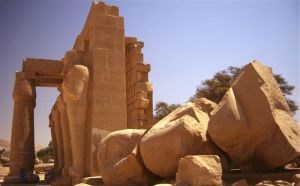
This raised another question. If we are always rebelling and trying to make our way to the top, why haven’t our creators wiped us out yet?
We have always been told that we alone are in control of our lives and that our decisions are our own; however, after debating the existence of free will, I feel that maybe this sense of control over our lives is like a safety protocol.
For instance, in the “Blade Runner” movies, replicants are given memories which are meant to give them a sense of identity. Memories are a huge deal for humans because without them, we have no idea of who we are or how to behave in the present.
Replicants initially have no life experience and do not know how to react in certain situations which makes them erratic and dangerous. But when given memory implants, they react to anything the same way humans would, which helps keep them in check.
The same thing applies to us. When we are given a false sense of control, it keeps us from rebelling because we think that we are already in control. While we keep believing that, the puppet masters will continue to pull the strings and ensure that we remain compliant without us knowing.
What’s our true potential?
Overall, I have been led to believe that humanity is a race of highly advanced biological machines, created to represent the advancement of higher beings. While we may be considered lower than these higher beings, it leaves me to wonder what we are truly capable of.
Will we be able to accomplish what people have explored in the realm of science fiction? Will we ever be capable of transferring consciousness to multiple bodies, interplanetary travel, creation of synthetic life, genetic manipulation and cures for incurable diseases? Will we become gods?
Only time will tell.



